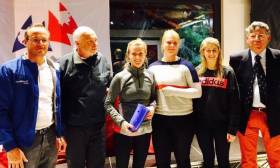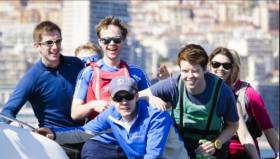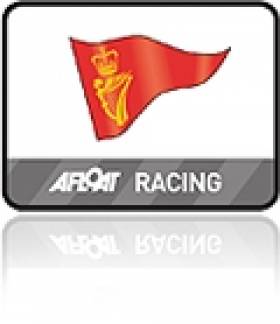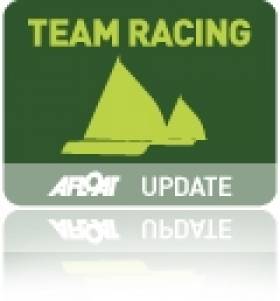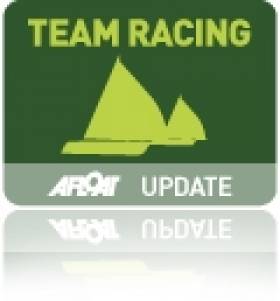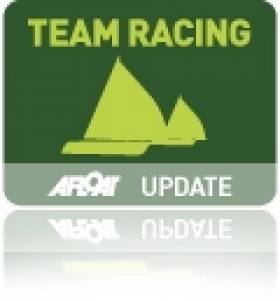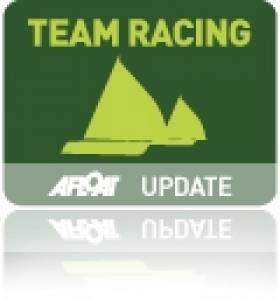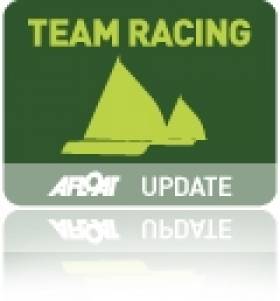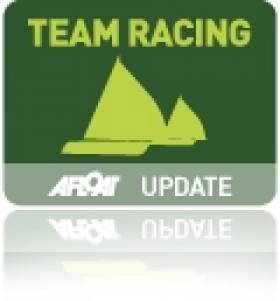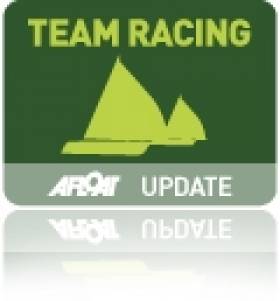Displaying items by tag: 2k
Royal Cork Keelboat Team Third In Venice 2K
#RCYC -The Royal Cork Yacht Club was represented this weekend at the Venice leg of the international 2K team racing circuit, hosted by the Compagnia della Vela di Venezia.
The mixed Cork crew, who enjoyed a strong finish in Anzio this summer, placed behind Britain’s Serpentine Racing and the winning Dutch-Italian contingent from the Yacht Club Costal Olanda, but ahead of the home team at Compagnia della Vela di Venezia.
The event, taking place from the 4th to the 6th of November, had 11 teams from Italy, Germany, The Netherlands, Britain, Ireland and Sweden competing in generally very light wind conditions. Unfortunately the final day of racing was cut short due to light winds and the results were awarded based on the round robin standings. The RCYC team were beaten by Britain’s Serpentine Racing and the winning Dutch-Italian contingent, known as Yacht Club Costa Olanda.
The team consisting of Fred Cudmore, Lisa Tait, Philip O'Leary, Sonia Minihane, George Kingston, Emma Geary, Sean Cotter and Sarah O'Leary finished in third place.
Royal Cork Yacht Club Second in 2K Team Racing Anzio
Over 3 days and no less than 42 races it was all down to the last match between the Dutch and their great rivals from Royal Cork. It was one of those starts that one wants to forget, but the Dutch clearly down, gambled on banging the corners to great effect. Back in the action at the windward mark the four boats were all within a boat length then it all started to unravel for Cork.
2K Team Racing is two on two team racing, in keelboats, without spinnakers.
Twin penalties for Smit (NED) and Kingston(IRL) saw the game balanced. then Cudmore(IRL) collected a penalty for tacking too close... the Dutch are in the lead... a final Irish penalty and it is all over...as the Dutch move into their tried and tested tight defence mode for the final run to the finish.
Host team Rome had had a hard regatta, losing to a rookie British team from the Royal Thames and to the young Italians from 3CV sailing as Banana 2....but the final honours were to go to them as then outplayed the Dutch to the closest of finishes in the final match....but all too late for the podium.
1st Dutch Match and Team Race Association (NED)
2nd Royal Cork Yacht Club (IRL)
3rd Royal Thames Yacht Club (GBR)
The 2K Tour now moves to another Italian Yachting paradise in Gaeta.
The Rome 2K was hosted by the Platu 25 Class and the Reale Circolo Canottiere Tevere Remo at the club's Anzio base.
#2K – Eight teams from Italy, The Netherlands, Germany, Great Britain and Ireland gathered at the Reale Club Tevere Remo, Rome for the first 2K tour event of 2015. Two days of intense round robin racing saw a three way tie break at the top between Cork, YYCS and Spinnaker.
The final day on Sunday started with rain and no wind but PRO Constanzo Villa managed to get in 4 of the critical race to complete the round robin. The final saw last year's runner up Royal Cork face YCCS. It was the Italians who emerged as winners in a sun drenched final.
Final Results
1st Yacht Club Costa Smeralda
2nd Royal Cork
3rd Spinnaker
4th Dutch Match and Team Racing Association
5th Rome Racing Team
6th Royal Thames
7th Serpentine racing
8th Bavaria Yacht Club
Forum For Irish Team Racing Discussion Opens Online
#teamracingforum – News that the Optimist dinghy class in Ireland is once again organising a team racing event, together with the announcement of plans for junior event in the Royal St George and the continuing development of 2K team racing in Europe confirm that team racing offers competitive sailing for all ages. With this new impetus the Irish Team Racing Association have set up a forum to allow 'in depth discussion' of a large number of topics regarding team racing and its development in Ireland.
The forum is reserved for active participants in team racing organised by ITRA. Delegates from IUSA, the Irish National Schools Sailing Association will be invited to participate if they do not qualify for access directly. As membership of ITRA is one topic that needs to be addressed access to this forum is limited to sailors, race committee and umpires who took part in the ITRA Nationals in 2013 and 2014.
The forum registration process is here
Royal Cork Yacht Club Third in Italian 2K Team Race Event
#2kteamracing – Teams from Howth Yacht Club and the Royal Cork Yacht Club travelled to Porto Ercole, Tuscany for the Italian- Cala Galera leg of the 2014 2K team Racing Circuit, from the 5th to 7th of September. Both teams enjoyed high intensity racing, some very tight matches, exceptional racing conditions, and beautiful scenery.
The Royal Cork team, led by skippers Fred Cudmore and George Kinsgton won 6 of the 9 races in the round robin, over the first and second day of the event. They went into day 3 of the event in second place, and faced the highly experienced 2K racers, Yacht Club Costa Smerelda in the first to two wins semi final. Racing went down to the wire, but unfortunately YCCS won 2-1. The Rebel army won their petit final, against the British Team Magnum, finishing the regatta in 3rd place. YCCS stormed on to beat the Rome Racing Team in the final.
Howth Yacht Club, competing at their first 2K event, had a slow start getting in only two races of their round robin on Friday. With more breeze on day 2, skippers Simon Rattigan and Geoff Tait were more in the groove of the 2 v 2 racing and they went on to win 4 from 7 of their races. On day 3, the team had the best seats in the house to watch the gold fleet finals, from their luxurious changeover yacht. They then took part in the "king of the castle" silver fleet final, and finished the event in 9th place.
The Royal Cork were represented by: Fred Cudmore, Emma Geary, Philip O'Leary, Sarah O'Leary, George Kingston, Ian Mc Namee, Philip Mc Glade, and Eimear O'Leary.
Howth were represented by Simon Rattigan, Aoife English, Ross Mc Donald, Rachel O'Brien, Geoff Tait, Lisa Tait, Rob Kerley and Jess Armstrong.
Full event report and results are available here
Top form from Munster team racers has produced second overall at a 2k team racing event in Italy. Three days of brilliant sunshine and great breeze set the backdrop for the most dramatic of 2K events. Teams from Italy, The Netherlands, Germany and Ireland gathered for what the international jury described as the closest racing the series has seen all year.
Day 1 saw the Cork Racing Team in blistering form, winning 6 of their 7 round robin races, and losing only to the Rome Racing Team.
DAY 2 was comprised of 8 hours on the water, 6 races, 5 wins. This left us 2nd overall in the Gold Fleet standings.
Day 3 started with a light breeze which quickly filled to a steady force 3, flat water, and 25 degrees under a cloudless sky.
In semi final 1, The Royal Cork Yacht Club met the seasoned Dutch Team, fresh from a winter of team and match racing.
Race 1, and a pre start error by the Dutch gives the lead to the Irish... Undeterred, the Dutch got back into the action only to watch the Irish team with great boat speed, take an easy 1-2. Declining to change boats, the Dutch quickly turned the tables in race 2 leaving the score 1-1. Race 3 goes to the Irish and their first slot in a 2K finals.
The all Italian semi final proved to be the shoot out all had expected with protest flags flying even before the prep. With positions changing on every leg, the young Roman team of Saverio Ramirez and Edoardo Scotti Mancinelli finally took the 3rd and final race to win 2-1, and the Italian Championships.
With time running out the Irish now entered the fray against the exuberant Romans. A poor start by Italy set the scene for an easy win....and so it was till the last 50 meters. With Scotti spinning, all was down to Ramirez, who started what was the most exciting of dog fights, some six penalty turns later and the Italians gained the inside at the pin, and locked the Irish out to win 2-3. The time limit of 4PM cancelled the chance of a best of three final, and so, the Italians took the title this time.
1st Reale Circolo Canottiere Tevere Remo
2nd Royal Cork Yacht Club
3rd Dutch Match and Team Racing Association
4th Yacht Club Costa Smeralda
5th Circolo Nautica Velo Argentario
6th Banana Race Team
7th AFAP Sailing
8th Bavaria Yacht Club
2k Cork Team Competes at Italian Team Racing Event
#teamracing – A Royal Cork 2K Racing Team skippered by George Kingston and Fred Cudmore compete at the Royal Club Tevere Remo in Rome today. After scoring fourth place at the last event at Yacht Club de Monaco, the team are ready for three days of intense racing.
The Cork team pictured above are: Fred Cudmore, George Kingston, Sarah O'Leary, Sonia Minihane, Phil O'Leary, Sean Cotter, Emma Geary and Ian McNamee
#teamracing – A two boat team representing the Royal Cork, and skippered by Frederick Cudmore & George Kingston, finished a credible 4th at last weekend's prestigious Monaco 2K Team Racing Invitational.
The Royal Cork were joined by 7 other 2-boat teams representing their clubs in this new discipline of team racing. '2K' (2 Keelboats) racing is a form of team racing where two boats sail against an opposing set, around a short and exciting course. The event was sailed in J24s and the competition featured America's Cup sailors, as well as experienced match racing teams.
A high pressure system over Monte Carlo ensured blue skies, but not much wind for Day 1. The majority of the action took place on the Sunday with 10-15kts and lots of very close racing.
The sailors completed one full round robin and saw the team from Costa Smeralda Yacht Club (ITA) setting the pace. The Royal Cork got off to a slow start with a narrow loss to the GBR 'Spinnaker Team'. RCYC then managed to defeat the Bavarian Yacht Club, The Yacht Club de Monaco team, and took a great win against Team GBR Serpentine/Royal Thames Yacht Club after an intense 4 boat jibing duel on the final downwind. Royal Cork then had an unfortunate gear breakage while in a race winning combination against the Dutch Match Racing Association entry that cost them a race, and ultimately, a podium position. Team Smeralda were the worthy winners and their experience as a team really paid off.
The event was a great success both on and off the water with Yacht Club de Monaco providing fantastic hospitality. There was champagne sailing, and the stunning backdrop of such an iconic and beautiful part of the world was unforgettable.
Plans are in place to keep in touch with our various club contacts at Y.C de Monaco, and proudly represent the Royal Cork at the 2015 event.
The next stop for the 2K Circuit is Rome, in late May, with the Royal Cork team gunning for a podium position.
The 2014 Royal Cork Team:
Frederick Cudmore (Skipper)
George Kingston (Skipper)
Ian Mcnamee
Sarah O'Leary
Emma Geary
Eimear O'Leary
Seán Cotter
Philip O'Leary
2014 Teams:
Spinnaker Auspicious (GBR)
Costa Smeralda Yacht Club (ITA)
Royal Cork Yacht Club (IRL)
Serpentine Sailing Royal Thames Yacht Club (GBR)
Bavarian Yacht Club (GER/AUS)
Dutch Match Racing Association (DUT)
Yacht Club de Monaco (MON)
Rome Racing Team (ITA
Respectable Finish For Royal Cork In Ireland's First 2K Tour Appearance
#London2K - Royal Cork Yacht Club's team finished a respectable fifth in the Royal Thames Invitational 2K Team Racing Regatta over the weekend.
Eight teams from around Europe took part in the event from 25-27 October that featured two-boat keelboat team racing using J80-type boats at the Queen Mary Sailing Club, near Heathrow Airport.
Fred Cudmore and Rob O’Leary led Ireland's first ever entry in the 2K tour, with team members Ross Deasy, Phil O’Leary, Sarah O’Leary, Jamie Donegan, Emma Geary and Eimear O’Leary.
And they distinguished themselves in a challenging field against the likes of current UK dinghy team racing champions Sam Littlejohn and Tom Hebbert of first place Spinnaker Auspicious.
Entries Open for First 2K Team Racing Euros Next Month
#TEAM RACING - The inaugural EUROSAF Team Racing European 2 Keelboat Championships will be sailed at Lelystad in the Netherlands on 21-23 September.
Entries are invited from teams of six sailors (only four of one gender) with no weight limit. The entry fee is €380, with a €500 damage deposit.
2K team racing is a spectacular form of the sport, as it is rare, when teams are evenly balanced, for one team to get in to a commanding lead.
The team with the last boat loses, so the only safe winning position is to be first and second, with a unassailable lead over the third boat. In all other situations attack and defence continue right up to the finishing line.
Irish teams would benefit greatly from their previous team racing experience, particularly suitable for sailors who have experience of team racing but who find that the Fireflies seem to have shrunk since they were in college! On the other hand the Dutch and the Italians have been honing their skills in 2K racing for several years. All in all, this should be a fascinating event.
The Notice of Race and Entry Form are attached below, and the Irish Team Racing Association requests any team proposing to enter to contact them at [email protected].


























